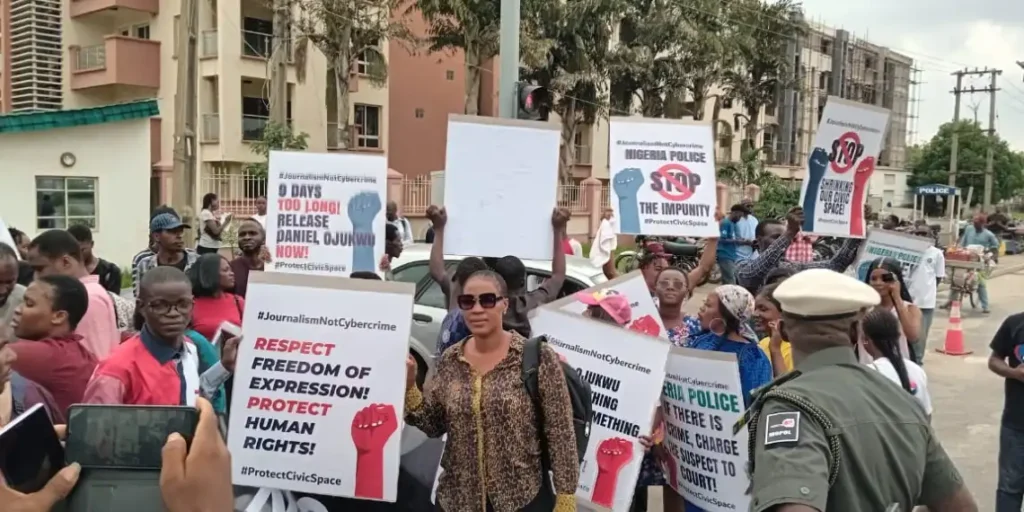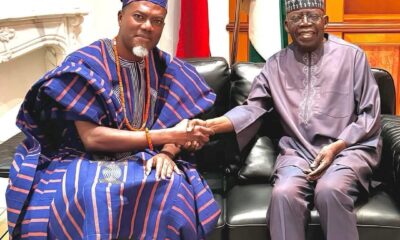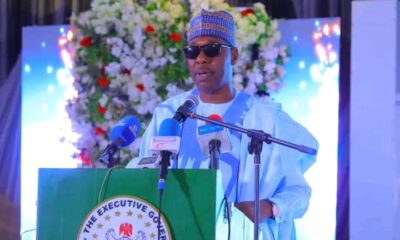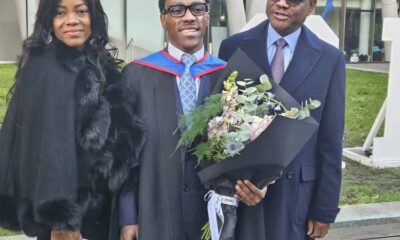FACT-CHECKS
Group Alleges Decline in Press Freedom and Civic Space Under Tinubu’s Leadership in Nigeria

Press freedom is on the decline and there is a shrinking of the civic space under President Bola Tinubu, a group of civil society and media organisations has said.
The coalition, Action Group on the Protection of Civic Actors, in a jointly signed statement, said it is “deeply concerned about the growing cases of attacks on press freedom, and the flagrant abuse of due process and the rule of law by the Nigeria Police…”
It mentioned the specific case of the arrest of a journalist, Daniel Ojukwu, who has been detained without trial for over a week due to his work.
“Particularly, the recent abduction and continued detention of Daniel Ojukwu, a journalist with the Foundation for Investigative Journalism (FIJ), exemplifies this disregard for the rule of law and democratic principles.
“Mr Ojukwu’s fundamental human rights have been blatantly violated. Even though the Nigeria Police has filed no formal charges, he remains in custody,” the group said.
READ FULL STATEMENT BELOW
Growing Concerns Regarding Press Freedom and Shrinking Civic Space in Nigeria
Civil society organizations across the country are deeply concerned about the growing cases of attacks on press freedom, and the flagrant abuse of due process and the rule of law by the Nigeria Police under the Inspector General of Police, IGP Kayode Adeolu Egbetokun, Ph.D., NPM.
Action Group on the Protection of Civic Actors, a Nigerian coalition of media and civil society groups working alongside international allies, sounds the alarm on the recent surge in attacks on press freedom and the silencing of dissent and civic voices.
A free press and public participation are fundamental pillars of our democracy. Thus, the continuous silencing of journalists and civic actors who hold power accountable undermines the provisions of Sections 22 and 39 of the Constitution of the Federal Republic of Nigeria, 1999 (as amended), which guarantees freedom of the press and freedom of expression, respectively.
Furthermore, the coordinated use of state resources, the mischievous interpretation and hyper-application of laws, especially the Cybercrimes Act of 2015 which has now been amended, and the abuse of power and public institutions are all draconian tactics deployed to further shrink Nigeria’s fragile civic space. These tactics have no place in a democracy, where accountability and transparency in governance are essential.
Particularly, the recent abduction and continued detention of Daniel Ojukwu, a journalist with the Foundation for Investigative Journalism (FIJ), exemplifies this disregard for the rule of law and democratic principles. Mr. Ojukwu’s fundamental human rights have been blatantly violated. Even though the Nigeria Police has filed no formal charges, he remains in custody. Additionally, Daniel’s unlawful arrest and detention contravenes the combined reading and cumulative effect of Sections 34, 35, and 41 of the Constitution of the Federal Republic of Nigeria, 1999, which protects his rights to respect for the dignity of his person, personal liberty, and freedom of movement.
Daniel Ojukwu’s case is the most recent in a recurring trend of similar attacks and harassment aimed at the media and other civic actors by Nigerian law enforcement and security agents. The familiar pattern these attacks seem to take is that the instrumentality of the Nigerian security apparatus is set loose on these individuals as soon as they express views unfavourable to the administration or in the case of journalists, as soon as they publish credible stories that cast the administration in an unflattering light. The expression of opinions, however critical they are of the government, is one of the critical bedrocks of democracy.
Consequently, we unequivocally condemn Daniel’s abduction and unlawful detention as unconstitutional, illegal, immoral, and unbecoming in a country that claims to practice democracy. We maintain that for Nigeria to claim its status as the continent’s largest democracy, its institutions and law enforcement agencies must uphold established standards and procedures consistent with democratic norms. Until then, Nigeria cannot reconcile the title of the “largest democracy in Africa” with the practices and principles reminiscent of a police state.
We also condemn the incessant use and abuse of the Remand Order process, which is observed to be the new machinery for which the Nigeria Police continuously violates the rights of Nigerian citizens. It is discovered that the Police boast of obtaining a Remand Order without providing such a document for the suspect or his lawyers to see whenever they unlawfully arrest individuals. Even when such orders are obtained, it is usually cloaked with suspicion as the Court from which it is obtained is usually miles away from the police station where the suspect is detained. Even where there is an established Court within a shorter distance of the Police station.
This is contrary to the rule of law, and it should be of great concern to the Police that it would be seen by the general public as an institution that acts and conducts its duties contrary to the Rule of Law, which is critical to the sustenance of our democracy.
Mr Daniel Ojukwu, if accused of a crime, should be promptly charged and given a fair trial under Nigerian law, which presumes innocence until proven guilty. As such, his continued detention is equivalent to an extrajudicial trial and punishment.
It is in the Inspector General of Police’s interest to offer opportunities for the international community to rate the Tinubu administration’s compliance and respect for its human rights commitments positively.
Premised on the above, we demand the following:
- President Bola Ahmed Tinubu and the Inspector General of Police, Mr Kayode Egbetokun, ensure Daniel Ojukwu’s immediate release and uphold his fundamental human rights, as his continued detention without charges undermines Nigeria’s democratic standing and risks further erosion of public trust.
- State resources are redirected towards securing the lives and property of Nigerian citizens rather than the abuse, assault, and attacks on civic actors.
- A rights-based review of laws that are subject to vexatious interpretations amending them to reflect democratic norms and principles.
- Invitations by the Police should be in writing, documented, and undersigned by their legal representatives. It is illegal to arbitrarily show up and pick somebody without stating cause.
- All requests for individuals to accompany law enforcement personnel to a station for questioning or detainment should be documented with a duly authorized warrant and acknowledged in writing by the individual, ensuring that their legal rights are understood.
Signed:
- Enough is Enough Nigeria
- Nigeria Network of NGOs (NNNGO)
- Invictus Africa
- Accountability Lab Nigeria
- Public and Private Development Centre (PPDC)
- Global Rights
- International Centre for Investigative Reporting (ICIR)
- Centre for Journalism Innovation and Development (CJID)
- Dataphyte
- Gatefield
- BudgIT Foundation
- WikkiTimes
- Hope Behind Bars Africa
- Partners West Africa
- Media Rights Agenda
- International Press Centre
- TheCable
- Premium Times
- Digicivic Initiative
- Foundation for Investigative Journalism (FIJ)
- BONews Service
(PREMIUM TIMES)
-

 CAMPUS REPORTS2 days ago
CAMPUS REPORTS2 days agoKwara Govt Provides Free Transportation, Ease Financial Burden On University Students.
-

 EDITORIAL1 day ago
EDITORIAL1 day agoReno’s Reversal : How A Vocal Critics Became a Tinubu Cheerleader
-

 CAMPUS REPORTS1 day ago
CAMPUS REPORTS1 day agoZulum Renames Borno State University After Kashim Ibrahim
-

 NEWS2 days ago
NEWS2 days agoWike Celebrates Son’s LLM Graduation at Queen Mary University





